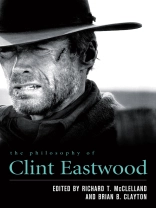Famous for his masculine swagger and gritty roles, American cultural icon Clint Eastwood has virtually defined the archetype of the tough lawman. Beginning with his first on-screen appearance in the television series Rawhide (1959–1965) and solidified by his portrayal of the ‘Man with No Name’ in Sergio Leone’s ‘Dollars’ trilogy (1964–1966), he rocketed to stardom and soon became one of the most recognizable actors in Hollywood. The Philosophy of Clint Eastwood examines the philosophy and psychology behind this versatile and controversial figure, exploring his roles as actor, musician, and director. Led by editors Richard T. Mc Clelland and Brian B. Clayton, the contributors to this timely volume discuss a variety of topics. They explore Eastwood’s arresting critique and revision of the traditional western in films such as Unforgiven (1992), as well as his attitudes toward violence and the associated concept of masculinity from the Dirty Harry movies (starting in 1971) to Gran Torino (2008). The essays also chart a shift in Eastwood’s thinking about the value of so-called rugged individualism, an element of many of his early films, already questioned in Play Misty for Me (1971) and decisively rejected in Million Dollar Baby (2004). Clint Eastwood has proven to be a dynamic actor, a perceptive and daring director, as well as an intriguing public figure. Examining subjects such as the role of civil morality and community in his work, his use of themes of self-reliance and religious awareness, and his cinematic sensibility, The Philosophy of Clint Eastwood will provide readers with a deeper sense of Eastwood as an artist and illuminate the philosophical conflicts and resolutions that drive his films.
İçerik tablosu
From solitary individualism to post-Christian stoic existentialism: Quests for community, moral agency, and transcendence in the films of Clint Eastwood
Hereafter and the problems of evil: Clint Eastwood as practical philosopher
The smile and the spit: The motivational polarity and self-reliance portrayed in The Outlaw Josey Wales and the Dollars trilogy
The representation of justice in Eastwood’s High Plains Drifter
Bad men at play: On the banality of goodness in Unforgiven
Aristotle, Eastwood, friendship and death
Giving up the gun: Violence in the films of Clint Eastwood
Eastwood, romance, tragedy
The use of silence in Hereafter: A study in neurocinematics
The mortal hero: Two inductions on the meaning of loss
Eastwood’s dream: The philosophy of absence in Hereafter
Desperate times call for existential heroes: Eastwood’s Gran Torino and Camus’ The Plague
Yazar hakkında
Brian B. Clayton is associate professor of philosophy at Gonzaga University and director of the Gonzaga University Faith and Reason Institute.












